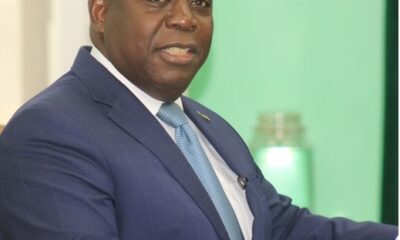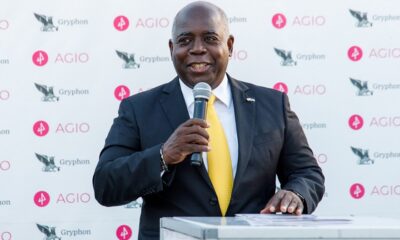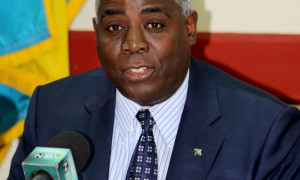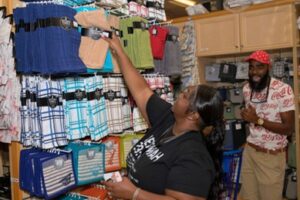#TheBahamas, May 18, 2022 – During a Communication in the House of Assembly, by Prime Minister and Minister of Finance the Hon. Philip Davis, tabling an Audit
Report into the operations of the National Food Distribution Task Force and the National Food Distribution Programme, on May 16, 2022, he said that his Government had found it “consistently difficult to obtain genuine answers”, about operations.
“In the case of the Food Programme, requests for credible documentation of how $53 million was spent have not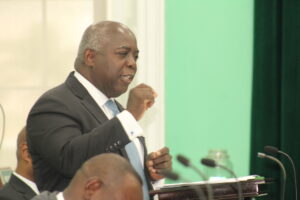 been answered,” Prime Minister Davis said. “To be clear, documents have been provided, but they are not documents that answer the most important questions posed.”
been answered,” Prime Minister Davis said. “To be clear, documents have been provided, but they are not documents that answer the most important questions posed.”
He continued: “To make an analogy, if someone asks, ‘How much did your car cost?’, and the car owner answers, ‘My car is blue’, an answer of sorts has been provided, but not one of great relevance to the questioner.
“In the case of the Food Programme, some documents have been proffered up, but they do not provide answers to the Bahamian people’s questions.”
Prime Minister Davis said that the 138-page Audit Report “makes for startling reading”.
“In the General Findings of the Audit Report, 18 categories of major deficiencies were noted,” he said. “These ranged from a widespread lack of record-keeping, and widespread inconsistences relating to the sums of money handled, to a complete absence of minutes being kept of meetings, agreements and actions.”
“In other words, although tens of millions of the Bahamian people’s dollars were being spent, not even the most basic safeguards were in place,” he added. “A government that speechified about transparency at great length and at every opportunity did not conduct even the most basic oversight of a major government initiative.”
Prime Minister Davis said that the audit was astounding in documenting “the failures of the government” in establishing reporting and monitoring protocols, or internal controls. He noted that the Task Force could not provide the auditors with information that should have already been completed and readily available.
“Even in the instances where information was provided, only aggregate totals were offered, with none of the supporting documents that would be critical to corroborate the figures,” he said. “There’s no back-up provided: no contracts, no cheques, no receipts and no bank statements to support the information. No evidence, in other words.”
“It is noteworthy, too, that some organisations concerned have still refused to provide any information whatsoever,” he added.
Prime Minister Davis pointed out that, given the sums of money involved, “the deficiencies are breath-taking”.
“Public Officers did not have oversight of the expenditure of funds,” he said. “Expenditure of millions of dollars remains unexplained and undocumented.
“No audited financial statements have been provided, so information provided by the NGOs cannot be confirmed.”
He added: “Information Dashboards presented by the Task Force did not reconcile to the information provided by NGOs. So, for example, just to highlight the point, if the
Task Force is saying that they gave an NGO $100,000, and the NGO is saying they only received $80,000, what’s happened to the difference?”
“In fact, numerous instances have been identified when the NGOs concerned did not account for the total amount funds received from the Government,” Prime Minister Davis continued. “As I said in the Mid-Year Budget, we uncovered $2 million that was sitting in an NGO’s account. I am happy to say that money was then recovered for the Bahamian taxpayer. Are there millions more sitting idle in other accounts?”
Prime Minister Davis noted that there was no consistent system of recordkeeping at the Task Force or NGO level; and it was simply not credible to believe that from May 2020 to October 2021, they were too busy to keep proper records.
“And some of the records which were kept, raise even bigger questions. Why were such exorbitant fees paid for some services?” he added.
Prime Minister Davis gave the example of one restaurant being paid $6 per box for the delivery of each food parcel. That, he noted, amounted to approximately $50,000 per month.
“Why did they pay $6 to deliver a single parcel of corned-beef, flour, rice and the other very basic items they delivered to families in need?” he said. “The delivery cost would have been more than the food itself.
“And to this day, despite numerous requests, two NGOs have still not provided any information at all, and combined, they received more than $10 million.
“$10 million of the Bahamian people’s money, has simply vanished.”
Prime Minister Davis also called on those with knowledge of the underlying facts to come forward. Those who had failed to provide answers and evidence still have an opportunity – and an obligation – to do so, he added.
“We do not prejudge the circumstances we have uncovered,” he said. “We cannot say definitively whether we are looking at jaw-dropping incompetence … or something considerably worse.
“For now, I encourage the Bahamian people to read the Audit Report for themselves.”
Release: BIS
PHOTO CAPTION: Prime Minister and Minister of Finance the Hon. Philip Davis speaks during a Communication in the House of Assembly, tabling an Audit Report into the operations of the National Food Distribution Task Force and the National Food Distribution Programme, on May 16, 2022.
(BIS Photos/Ulric Woodside)






